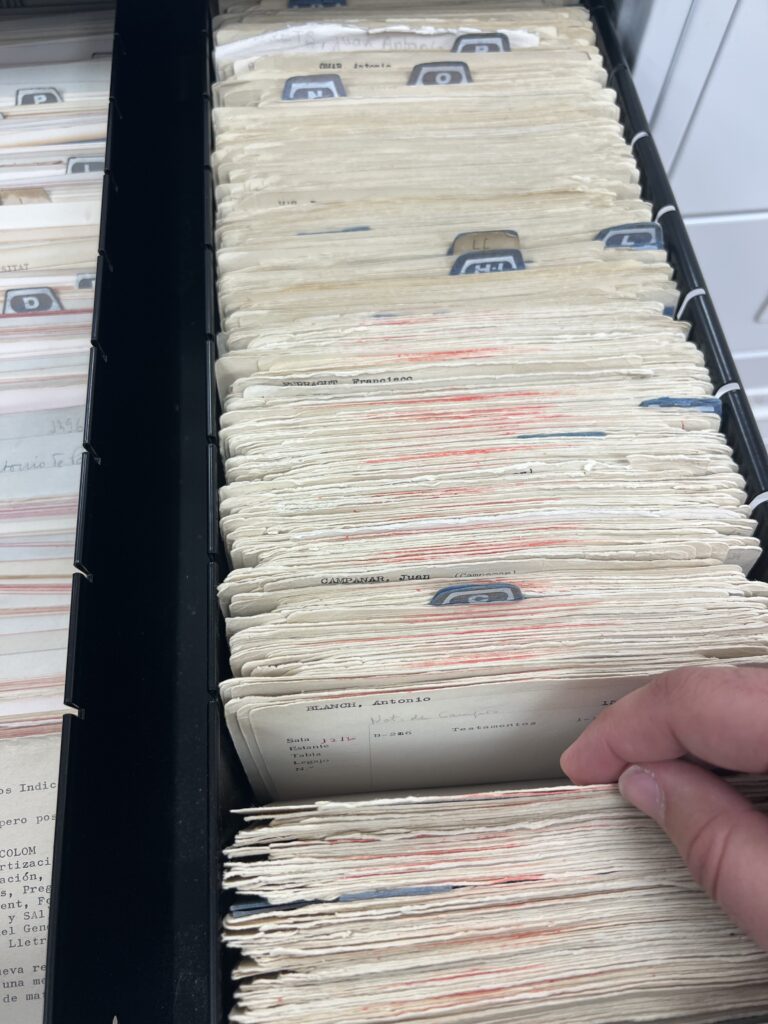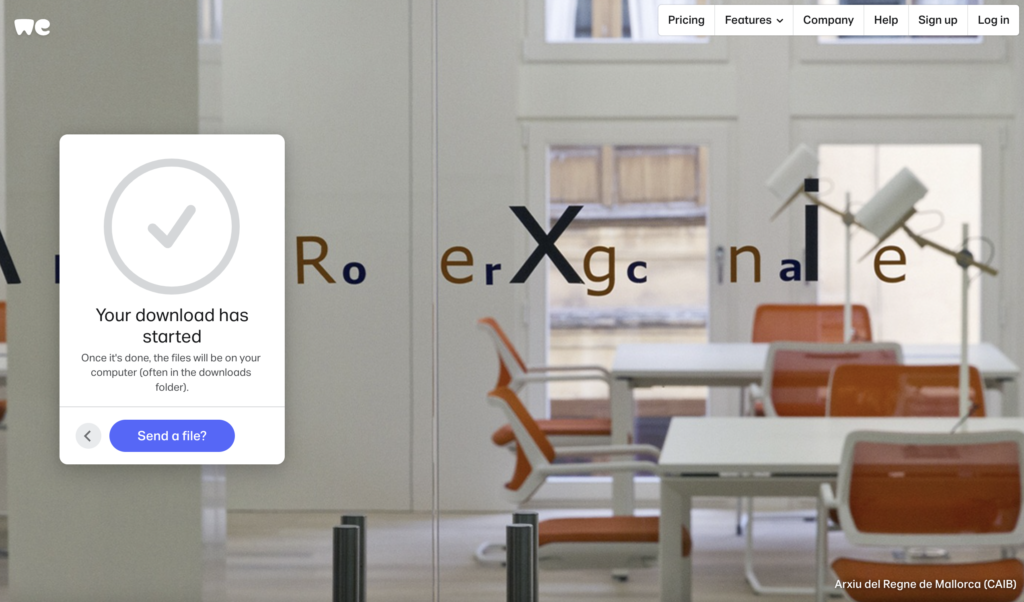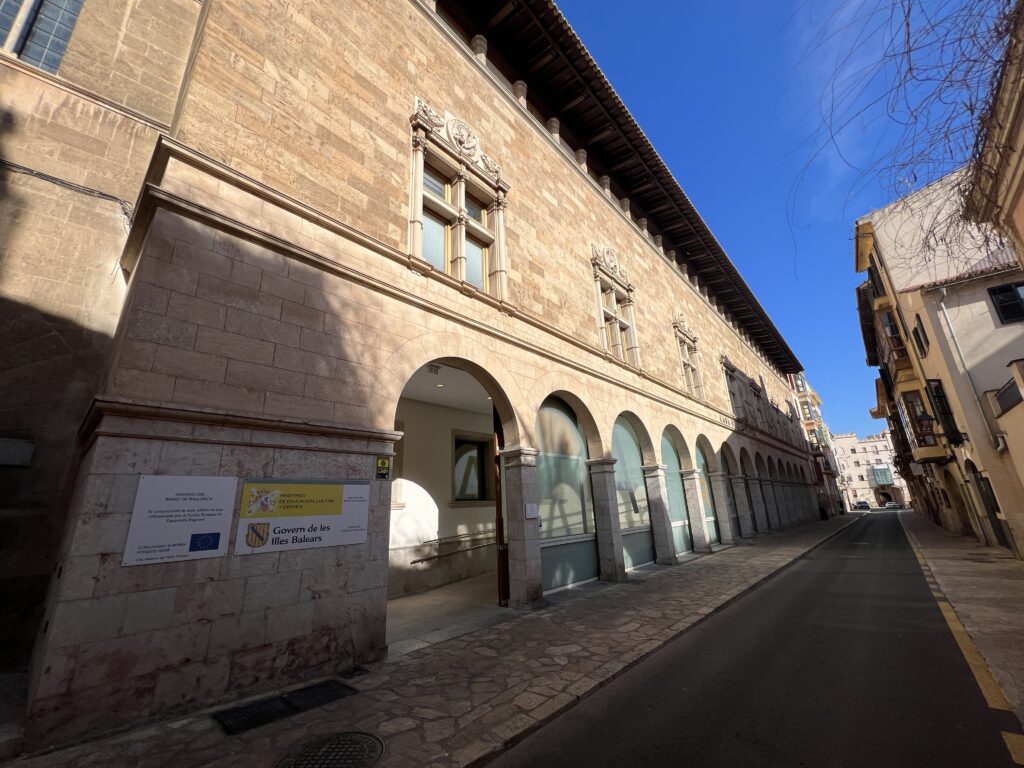Another place I want to highlight on my trip to Mallorca is the Arxiu del Regne de Mallorca (Archivo del Reino de Mallorca) or simply the ARM. It is probably not so commonly known to researchers coming to the island since many people researching are interested in looking for birth, marriage, and death records which can be found in the Arxiu Diocesà – which I talked about a few weeks back. However, the Arxiu del Regne de Mallorca can have other records such as testaments that might prove interesting or important to read when it comes to researching your ancestors as well. So in this post I will talk about how I went about doing research here.
Before getting started
I was lucky that the Arxiu del Regne was close to my youth hostel, which meant that I could easily walk by it to see the hours it was open and to ask any questions before I actually needed to start researching. So one day I decided to walk by and ask some basic questions about getting research done.
For example, I was to bring a form of ID (in my case my passport) along, gloves in order to touch the books, and an idea of notaries and dates I wanted to research.

The Arxiu del Regne de Mallorca also has a website (linked in this previous sentence). Since I was already in Palma I could walk by to see the hours, which showed that the archive was open Mondays, Tuesdays, and Thursdays from 9:00AM-7:30PM. I was pleasantly surprised with how long their hours were, especially since they are probably not one of the more well-known research centers. However, I imagine they service other clients and not just genealogists which is why they have longer hours. Nonetheless, I was happy to see they were open on Tuesdays and Thursdays because that meant I did not have to divide my time between the Arxiu Diocesà and the Arxiu del Regne and could visit both places with enough time for research basing my searches on the latter with what I found in the former.
Revving up My engines
Finding gloves and having my passport ready were the easy steps, having the names of notaries and dates would be the most important and crucial step for me to actually get research done. In the Arxiu del Regne, you can find documents dating from the 1700s and back and if you’re lucky some from the early 1800s. Which meant that I had to find ancestors who lived in the 18th century and would have left a will or testament behind that I would be able to find via a notary.
This would mean that I would have to dig through the death records in the Arxiu Diocesà and find some potential ancestors with testaments. In researching the deaths of Sóller, I noticed that many people testified with the same notary – likely because it was/is a small town and so with this name and a few years in mind I returned to the Arxiu del Regne de Mallorca.
Caveat: Many testaments written in the 19th and 20th century are held in the Colegio Notarial which is much stricter on who can actually see these records. In order to view any of the testaments/wills located here you need to prove inheritance descendancy and not just a genealogical connection to the ancestor in question. Which means that you simply can not be a great-grandson interested in viewing the record of an ancestor, you need to be in line to receive some property and if there is someone alive before you (say a parent or grandparent) you need written and authorized person via them to receive copies of said document. Since I am not in line to inherit anything from my 2nd great-grandfather, I can not view his will until it becomes public via the Arxiu del Regne in probably close to another 60+ more years! I am really hoping this changes soon because in many other countries, you can view these type of documents once they hit 100 years of age.
Initial Research
At the Arxiu del Regne you can not have your bag, jacket, etc. with you – everything needs to be left in a locker for which you can pay 1€ which you get back once you return the key to the locker. You are able to have a computer but it can not have a case on it. After leaving my things, I went to the counter to see how I could begin doing research. I told the archivist that I had a notary in mind and some dates as well. With that we went over to the filing cabinet to see what they had on the notary – Salvador Canals.

I was able to find Salvador within the index cards and the dates for which he had available documents. His records were broken down into “Testamentos e Inventarios” and then “Protocolos”. I wanted to focus on the testaments which ranged from 1671-1720, with that information I was able to find call numbers for certain books of his. I was able to request them in the moment, wait a few minutes for them, and then get the books. While I was researching, the archivist was entering my information, such as name, DOB, address, passport number, etc. into the system so that in the future it would be easier for me to return and research.

It was a bit overwhelming to be handed since a big tome and to conduct research which for example were mainly Catalan entries with Roman numerals for years. Luckily, most of his books had an index where you could find the name of the person and the page number for that person. Also, his books where divided by letters so you can see here that book 3401 ranged from “D, E, F, G, H, L, R, S”. For other surnames they would be held in other testament books.
Requesting copies
After identifying some potential ancestors I wrote down the page number in the book and asked for copies. They said copies were possible to make and they would be emailed to me once they got a payment confirmation from one of the bigger offices that controlled this procedure. The copies I think worked out to 0.10€ or 0.12€ which is extremely cheap. I had left the island by the time I got the email so it definitely took a few days for the paperwork to go through. Equally, I could have done my research there and just taken some notes but since the copies were fairly cheap I decided to ask for copies and read them later on.

Truth be told I am still shifting and going through the records I received. Since coming back from Mallorca I have not dedicated too much time to reading through the testaments, especially since I will not be able to continue research until I am back on the island. So for now, my Mallorcan research has taken the back burner until I have more time to dedicate to it or until it becomes relevant to me again. Nonetheless, I have the copies from the Arxiu del Regne de Mallorca and they are fairly clear which is good to see because it makes reading the documents much easier from that time period.
Some initial observations from what I have gleamed: the person in question usually mentions who their marmasors were. This was a new word that I learned in Catalan while looking at death records, which in English is executors or albaceas in Spanish.
For example, on August 21, 1720 my ancestor Margarita Vallespir (widow of Pere Miró) received her sacraments, and left her power to Guillem Bisbal, the notary, and mentioning her executors as Pere y Jaume Miró brothers, her sons. This would mean that in the will we should be able to find Pere and Jaume being left something (whether a home, money, etc.) and the mention of any other transactions that came along with her death.
This type of information helps to identify the next of kin, spouse’s living status (whether deceased, alive, or married more than once), and sometimes even the name of the parents if they themselves were still alive and/or a part of any inheritance. This can then help narrow down years in order to find death records.
Researching testaments can be a great way to better understand a family’s structure (especially the children), the worldly possessions a family could have left behind, and sometimes even where in the town the family could have lived. They are a great way to supplement deaths which do not always give you a ton of information.


My great grandfather was from Mallorca. I’ve been to the island twice and have been able to obtain birth, marriage and death certificates….also visited the towns and cemeteries where my ancestors lived. Your posts have been very helpful for my next visit. Thank you.